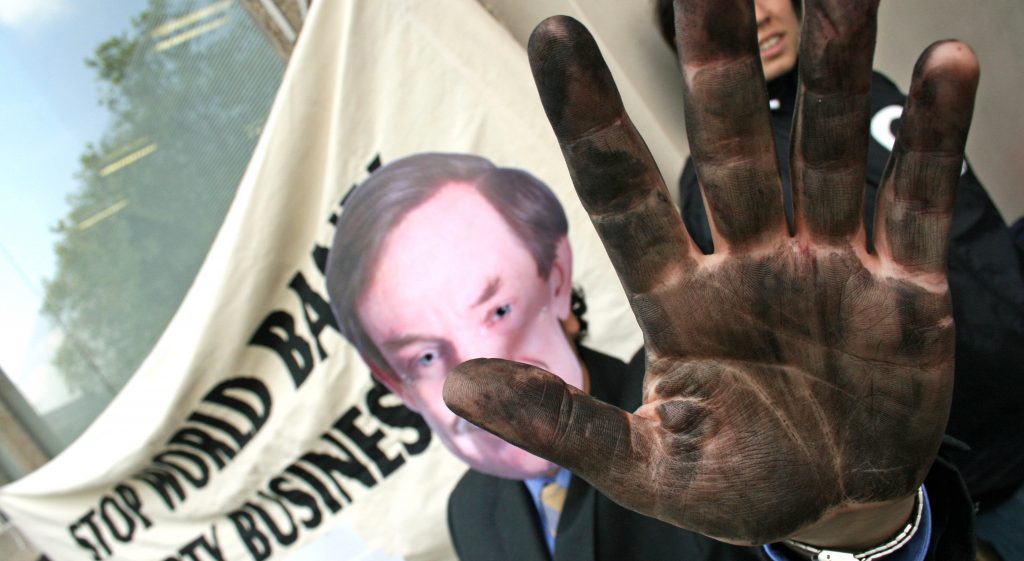Brussels, May 27 – A meeting of the World Bank in Brussels was targeted by campaigners today urging it to stop financing fossil fuel projects.
Activists gathered outside the meeting at which bankers, EU officials, industry representatives and other stakeholders were discussing the future of the bank’s energy lending. They staged a peaceful ‘black comedy’ and handed out dirty contracts for so-called ‘clean coal’ to expose the disastrous impacts of the bank’s financing on climate change and the world’s poorest people. Civil society representatives later went inside to participate in the consultation.


The World Bank has ear-marked massive funds for investment in fossil fuels, especially large coal projects. Between 2007 and 2009, the World Bank increased funding for fossil fuels by 22% [1]. Since 2007 the World Bank Group has provided $6.6 billion for coal-based energy development. [2] This strategy locks developing countries into carbon intensive energy models for decades instead of helping developing countries to make the transition to sustainable energy production.
The latest illustration of the bank’s climate-damaging lending is the Eskom project in South Africa, to which the World Bank approved a $3.75 billion loan in April. Most of the money will be used for the building of the Medupi power plant, one of the largest and dirtiest coal fired plants in the world. Over 165 civil society groups and some governments were opposed to the World Bank loan to Eskom, because of its disastrous environmental and climate impacts, and as it will 
 mainly benefit large foreign multinational corporations to the detriment of South Africans, perpetuating a serious energyapartheid in the country. [3]
mainly benefit large foreign multinational corporations to the detriment of South Africans, perpetuating a serious energyapartheid in the country. [3]
Anne-Sophie Simpère of Friends of the Earth France said: “The World Bank should use its energy strategy review to stop financing fossil fuels and to redirect its investments to renewable energies and energy efficiency. The World Bank must make the needs of local communities and the global need to fight climate change paramount in its lending policy.”
Similar demonstrations have taken place in South Africa and the United States.
***
NOTES:
[1] Bank Information Center, December 2009. http://www.bicusa.org/en/Article.11675.aspx
[2] Fuelling Contradictions. The World Bank’s energy lending and climate change, BWP, CRBM, Urgewald, April 2009. http://www.crbm.org/modules.php?name=browse&grpid=11
[3] The Eskom project is the sad illustration of the World Bank fondness for large coal projects in emerging economies, that is absolutely incompatible with its poverty reduction mandate and with the global emission reduction targets being discussed at multilateral level.
The World Bank is actively communicating on its climate change role, creating trust funds and initiatives to stop climate change and proposing itself for the management of global climate finance. The reality of its lending portfolio and of its democratic deficit in the internal governance demonstrates that the Bank should have no role in the global climate finance architecture.
Campaign groups are asking the World Bank to stop financing fossil fuel projects and to redirect its investments to renewable energies and energy efficiency for the benefit of the world’s poorest. The World Bank energy strategy review is an important opportunity to make this step.






